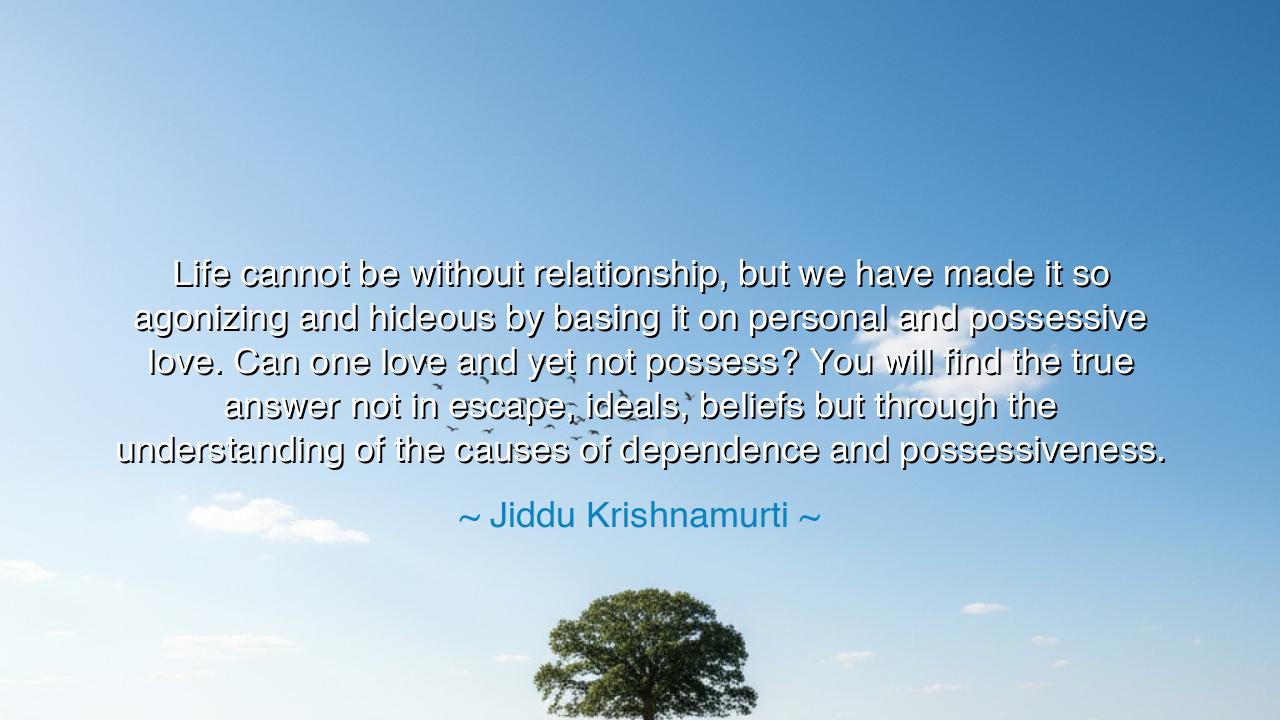
Life cannot be without relationship, but we have made it so
Life cannot be without relationship, but we have made it so agonizing and hideous by basing it on personal and possessive love. Can one love and yet not possess? You will find the true answer not in escape, ideals, beliefs but through the understanding of the causes of dependence and possessiveness.






Hearken, O children of the ages, to the words of Jiddu Krishnamurti, who speaks with the voice of timeless wisdom: “Life cannot be without relationship, but we have made it so agonizing and hideous by basing it on personal and possessive love. Can one love and yet not possess? You will find the true answer not in escape, ideals, beliefs, but through the understanding of the causes of dependence and possessiveness.” Here lies the eternal teaching that love, when untainted by selfish desire, is liberation; yet when bound by possession, it becomes the forge of suffering.
In the chronicles of old, the elders observed that the human heart, when driven by desire to claim and own, distorts the beauty of connection. A relationship rooted in control or personal love breeds agony, while a heart attuned to the freedom of another nurtures harmony and clarity. Krishnamurti reminds us that to truly love is to honor the essence of the other without chaining it to our will, and that true understanding emerges only when we confront the causes of our possessiveness.
The origin of this wisdom is ancient, found in the teachings of sages, mystics, and philosophers who discerned the delicate balance of attachment and freedom. Across temples, gardens, and councils, it was known that bondage in love leads to sorrow, while the surrender of ownership in affection fosters enlightenment. The path to authentic love is neither in escape, nor in abstract ideals, nor in rigid beliefs, but in the mindful recognition of the forces within the heart that seek to dominate, control, and cling.
O seekers, understand that the challenge of the soul is to navigate the waters of relationship without entangling in possessiveness. The heart must observe itself, inquire into its desires, and recognize the hunger that seeks to own rather than to honor. Through such understanding, the spirit discovers freedom, the pain of attachment is diminished, and love becomes a radiant force, unbound and pure.
Let this teaching endure, children of the future: cultivate love that does not chain, nurture bonds that do not suffocate, and seek understanding of the causes that breed dependence and possessiveness. Life, though inseparable from relationship, need not be agonizing or hideous. Through awareness and insight, the soul can transform connection into a sacred exchange of freedom, compassion, and mutual respect.
In this eternal truth, the mortal learns that love is not the dominion of desire, but the embrace of presence. By discerning the roots of possessiveness and dependence, by relinquishing the impulse to control, one discovers the heart’s capacity to connect without bondage, to cherish without suffering, and to live within relationship as a path of liberation, clarity, and profound joy.
If you wish, I can also craft a more poetic, ceremonial version, where love and possessiveness are depicted as opposing forces in the sacred arena of the soul. Would you like me to do that?






TTTo Thi Thuy
Jiddu Krishnamurti’s words make me wonder about the depth of human relationships. If we removed possessiveness from love, would it still be as fulfilling? Do you think people would have a harder time maintaining relationships without the need for control, or would we discover a deeper and more peaceful kind of love?
BNBaohann Nguyen
This quote makes me question the way we’ve been conditioned to think about love. Is love supposed to come with expectations, or can we truly love without attaching ownership to it? It seems like understanding the roots of possessiveness could lead to healthier relationships. How do you think we can create this kind of awareness in our interactions with others?
Jjeondtkvy
Krishnamurti’s view about love without possession really resonates with me. It’s so true that we often create unnecessary suffering by clinging to people. But can we ever fully separate love from attachment? Is it even possible to love freely, without expecting to possess or control? How do you think we can start to shift our mindset around love in relationships?
GKNguyen Gia Khang
I find Krishnamurti’s perspective thought-provoking. If we understand the root causes of dependence and possessiveness, maybe we can free ourselves from the pain they cause in relationships. But how do we go about truly understanding those causes? Is it something we can easily change in ourselves, or does it require deep self-reflection and time?
QTNguyen Quang Thang
This quote challenges so many conventional views about love. The idea of love without possessiveness seems radical, but perhaps Krishnamurti is right—our dependence on each other often causes unnecessary suffering. Do you think relationships are healthier when we stop trying to own or control others, or is a certain level of possessiveness natural and protective in relationships?